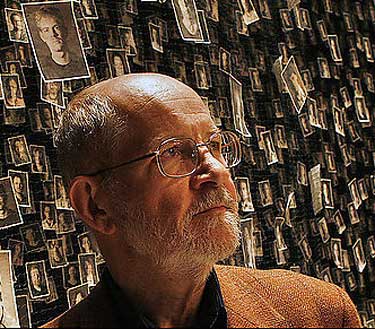Taking a Chance on Sophie's Choice
By Stephen Brookes • The Washington Post • September 20, 2006
___________________________________________________________________________________
Sophie's Choice, William Styron's searing 1979 novel, is nothing if not operatic. The tale of Auschwitz survivor Sophie Zawistowska's attempt to build a new life in America is almost unbearably tragic, careening through a nightmare of passion, madness, cruelty and death, until it reveals the devastating act of brutality at its core.
Operatic, definitely. But is it opera? Or, more precisely, is the sprawling, troubled opera that British composer Nicholas Maw unleashed on the world four years ago finally ready for prime time?
Nicholas Maw By Nikki Kahn - The Washington PostThe Washington National Opera, which is giving Maw's "Sophie's Choice" its American premiere tomorrow, is betting it is.
But it's a big bet. The opera received a lavish -- and lavishly hyped -- premiere in London's Covent Garden in 2002, when it had five sold-out performances and was praised by conductor Sir Simon Rattle as "an instant classic." But it was widely and savagely beaten by critics who (though they praised the music and swooned over the singing) found the opera itself a sodden mess.
"Too long, too wordy and . . . too discursive to establish a dramatic pulse," sniffed the Financial Times. "It rambles on at a leisurely pace and gets nowhere," echoed the Daily Telegraph, complaining that "it has no edges, no ambiguities, no crackle of tension." The London Times voiced a note of hope when it said that "cocooned inside . . . [this] four-hour opera is a two-hour masterpiece struggling to get out." But the Guardian hammered in a final nail. "As it stands," the paper wrote, "the opera is unworthy of revival."
It might have expired then and there, but the work's charms proved irresistible. After all, the music was gorgeous -- virtually everyone agreed on that -- and Styron's tale of the beautiful, broken Sophie, her volatile lover Nathan Landau and the naive young writer they befriend already had an impressive track record. The novel shot to the top of the bestseller lists, won the 1980 National Book Award, became an Oscar-winning film starring Meryl Streep and is routinely ranked as one of the top 50 American novels of the 20th century.
How could the opera fail?
So after a respectful pause of several moments, the Washington National Opera jumped in. Partnering with Vienna's Volksoper Wien and Deutsche Oper Berlin, they put together an all-star resuscitation team. The four original leads -- super-mezzo Angelika Kirchschlager as Sophie, Rod Gilfry as Nathan, Gordon Gietz as Stingo and Dale Duesing as the Narrator -- were retained for the U.S. premiere. The Baltimore Symphony's Marin Alsop, who has a reputation as a tough, brainy conductor, was hired to conduct. And wunderkind director Markus Bothe was brought on board to carve the original disaster into shape. They test-drove a new version in Europe late last year, and now, after even more surgery, the production is slim, trim and ready for American audiences.
Maybe.
"It's a completely different production," says Bothe during a rehearsal break at the Kennedy Center last week.
"In Covent Garden, the performance was 4 1/2 hours. With us it will be just over three hours." He's also junked director Trevor Nunn's original staging (which called for 17 head-spinning set changes) and replaced it with a single set and an almost minimalist approach. The streamlining has moved the focus back on the music, where it belongs, he says. But the process hasn't been easy.
"It's very hard to make cuts -- it's like chopping off limbs," says conductor Alsop, who is making her debut with the Washington company. "But I think it works well. The music's beautiful; it's very romantic, in a dissonant kind of way, and I think it suits the text and the story line beautifully."
The opera's odyssey began in the early 1990s, when Maw (who now lives in Takoma Park and teaches at Baltimore's Peabody Conservatory) stumbled across the 1982 film of the story, renting it one night on the advice of a friend.
"I was stunned by it," he recalls. "I thought it was a remarkable subject matter, and one which was still so important to us as one of the great horrors and tragedies of the 20th century. It immediately filled me with passion with the idea of writing an opera."
The inspiration came as something of a shock. Maw has been one of Britain's most respected and thoughtful composers for decades, writing in an expressive, accessible style ("my music is very much within the romantic code," he says), and he'd already written two well-received operas. Unpleasant experiences getting them produced in Europe, though, had soured him on the whole genre.
"Often, when opera companies are doing an opera by a living composer, they immediately regard it as theirs -- it's not the composer's anymore," he explains with a slight grimace. "I didn't want to be involved with writing operas again."
But "Sophie's Choice" hit him so hard that he began sketching out a dramatic treatment, eventually sending it to Styron himself and inviting him do the libretto. The novelist declined. "He said, 'I'll leave it to you,' " says Maw. "So I decided to write the libretto myself."
Angelika Kirchschlager O. WatkinsIt was a bold but risky decision. While "Sophie's Choice" is a gripping novel, it's also subtly structured and breathtakingly complex. Things are rarely what they seem, and the ground shifts constantly underfoot. In fact, it's those shifts that propel the drama forward. The line between Brooklyn and Auschwitz shimmers and dissolves, ribald comedy alternates with vicious cruelty, and as Sophie's lies and delusions crumble around her, it's never clear whether she's a hapless victim -- or deeply complicit in the most profound evil of the century.
That ambiguity makes the book (and Sophie herself) fascinating, but it also means that reworking "Sophie's Choice" for the musical stage would be a challenge for even the most experienced dramaturge. As a neophyte, Maw took a cautious, almost reverential approach to the text.
He clung tightly to the book's structure, chopping most of the humor ("I just took those parts which are very much related to the subject matter," he says) and using almost nothing but Styron's original words.
The result, some critics have suggested, is less an opera than a "sung novel." While that may have been true for the original production, Bothe insists that the new, streamlined version has punched up the stage drama, while giving the music more room to express the crucial psychological drama.
And that may be its saving grace. The opera's score (as heard in rehearsal last week) is complex. It is romantic and at times almost expressionist in style. At turns playful, brutal, mysterious and explosive, the music has elegant torrents of passage work in the winds, and vocal writing that attempts to recapture the love, rage and agony that are the lifeblood of Styron's novel.
"It's very dark, restless music," Alsop says. "Paradoxical, enigmatic, ambiguous -- one is slightly uncomfortable the whole time. The dramatic moments are very dramatic, and they're very lush -- almost cinematic, in a way. But it's not a sentimental piece at all, and that's important -- it doesn't treat any dimension of this story in a trite or simplistic way."
With "Sophie's" American premiere a day away, Maw is confident. It's a "very American" story, he says, and the subject of the Holocaust is compelling and still relevant. And perhaps most important, the story, for all its tragedy, is a story about the redemptive power of a great and passionate love.
And for Maw, that's the key. "If you're going to write an opera, it has to include passion," says Maw. "Otherwise," he adds softly, "it's not opera."
Sophie's Choice by the Washington National Opera is at the Kennedy Center Sept. 21, 24, 27, 30 and Oct. 5 and 9. For more information call 202-295-2400.or visit http://www.dc-opera.org .
© 2006 The Washington Post Company
References (11)
-
 Response: wrought iron chandeliers
Response: wrought iron chandeliers -
 Response: Punjabi Romantic Songs
Response: Punjabi Romantic Songs -
 Response: Hindi Song Lyrics 2020
Response: Hindi Song Lyrics 2020 -
 Response: Manali Tour Packages
Response: Manali Tour Packages -
 Response: https://anjun1.net/
Response: https://anjun1.net/ -
 Response: New Punjabi Song Lyrics & Videos
Response: New Punjabi Song Lyrics & Videos -
 Response: Latest Bollywood Songs Lyrics
Response: Latest Bollywood Songs Lyrics -
 Response: Latest Love Song Lyrics
Response: Latest Love Song Lyrics -
 Response: Portuguese SongsExclusive collection of Portuguese Songs from United States and all over the world. We have a latest and most accurate collection of old and new Portuguese songs.
Response: Portuguese SongsExclusive collection of Portuguese Songs from United States and all over the world. We have a latest and most accurate collection of old and new Portuguese songs. -
 Response: Song Lyrics and Video
Response: Song Lyrics and Video -
 Response: Pagalall
Response: Pagalall


Reader Comments